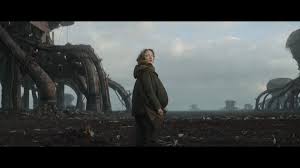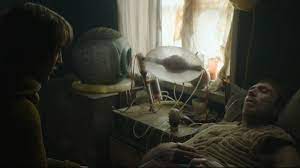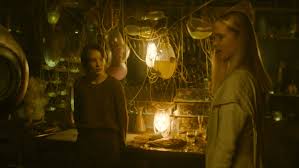🎬 Vesper (2022)

Vesper (2022) Review
Introduction
Vesper (2022), directed by Kristina Buozyte and Bruno Samper, is a visually arresting and emotionally poignant sci-fi film set in a post-apocalyptic world. With its haunting atmosphere, innovative world-building, and thought-provoking themes, Vesper stands out as a gem in contemporary science fiction. The film follows the journey of a resourceful teenage girl navigating a desolate landscape dominated by bioengineering and ecological collapse. Let’s explore how Vesper crafts its narrative and visual brilliance in this detailed review.
Plot Overview
Set in a world ravaged by ecological disaster, Vesper tells the story of its titular protagonist, a 13-year-old girl (played by Raffiella Chapman), who survives with her paralyzed father, Darius (Richard Brake). The planet’s biosphere has been devastated, leaving the remnants of humanity struggling to survive in a society divided between those who live in Citadels—wealthy havens of advanced technology—and the destitute, who scrape by in the wilds.
Vesper, a skilled biohacker, dreams of a better future. When she encounters Camellia (Rosy McEwen), a mysterious woman from a Citadel who crashes nearby, Vesper’s life takes a dramatic turn. As secrets about Camellia’s origins come to light, Vesper must navigate a dangerous path involving her unscrupulous uncle Jonas (Eddie Marsan) and a fragile alliance that could determine the future of her world.
Strengths
1. Exceptional World-Building
Vesper excels in creating a richly detailed and immersive post-apocalyptic setting. The filmmakers employ a combination of practical effects, intricate set design, and CGI to depict a world teeming with strange, bioengineered organisms and decaying ecosystems. The visuals evoke both wonder and despair, painting a vivid picture of a future shaped by humanity’s hubris.
2. Raffiella Chapman’s Standout Performance
At the heart of the film is Raffiella Chapman’s compelling portrayal of Vesper. Her performance captures the character’s resilience, intelligence, and vulnerability, making her a relatable and inspiring protagonist. Chapman’s nuanced acting anchors the film emotionally, drawing viewers into Vesper’s struggle for hope and agency.
3. Thought-Provoking Themes
The film delves deeply into themes of environmental degradation, class disparity, and the ethical implications of bioengineering. These ideas are woven seamlessly into the narrative, offering viewers a contemplative experience without overshadowing the story’s emotional core.
4. Hauntingly Beautiful Visuals
The cinematography by Feliksas Abrukauskas is breathtaking, capturing the eerie beauty of the film’s dystopian landscape. From the glowing bioluminescent organisms to the decayed remnants of human civilization, every frame is a visual masterpiece that immerses the audience in Vesper’s world.
5. Atmospheric Sound Design and Score
The film’s soundscape plays a crucial role in building its immersive atmosphere. Dan Levy’s score combines haunting melodies with ambient sounds, perfectly complementing the film’s tone. The subtle use of sound effects, from the rustle of mutated plants to the hum of bioengineered drones, adds depth to the world-building.
Weaknesses
1. Pacing Issues
While Vesper is a visually and thematically rich film, its pacing may feel slow for some viewers. The deliberate unfolding of the narrative prioritizes atmosphere and character development over plot momentum, which might not appeal to those seeking fast-paced action.
2. Underexplored Secondary Characters
Though Vesper and Camellia are well-developed, other characters, such as Jonas and Darius, could have benefited from more nuanced arcs. Jonas, in particular, feels somewhat one-dimensional as an antagonist, lacking the complexity that would make him truly memorable.
3. Ambiguous Resolution
The film’s ending leaves several questions unanswered, which may frustrate viewers seeking closure. While the ambiguity aligns with the film’s contemplative tone, it could feel unsatisfying for those looking for a more definitive resolution.
Themes and Symbolism
1. The Fragility of Nature
Vesper portrays a world where humanity’s disregard for nature has led to catastrophic consequences. The mutated organisms and decaying ecosystems serve as a grim reminder of the delicate balance between progress and environmental stewardship.
2. Hope and Resilience
Despite the bleak setting, the film emphasizes the importance of hope and perseverance. Vesper’s ingenuity and determination symbolize the potential for renewal and adaptation in the face of overwhelming adversity.
3. Ethics of Bioengineering
The film raises questions about the ethical boundaries of genetic manipulation. The Citadels’ monopoly on advanced technology contrasts sharply with the struggles of those in the wilds, highlighting the moral dilemmas of scientific advancement.
Visual and Technical Aspects
1. Production Design
The detailed sets and props create a tactile, lived-in world that feels both alien and familiar. The organic, almost grotesque designs of the bioengineered organisms add a unique visual flair.
2. Special Effects
The seamless integration of practical effects and CGI brings the film’s dystopian world to life. The visual effects are both understated and effective, enhancing the story without overwhelming it.
3. Cinematography
The film’s use of lighting and color contrasts the natural beauty of the wilds with the sterile, artificial environments associated with the Citadels. These visual contrasts reinforce the film’s thematic exploration of humanity’s relationship with nature.
Final Verdict
Vesper is a visually stunning and emotionally resonant sci-fi film that combines innovative world-building with a heartfelt narrative. While its pacing and secondary character development may not appeal to all viewers, the film’s strengths lie in its thought-provoking themes, exceptional performances, and breathtaking visuals. For fans of atmospheric, cerebral science fiction, Vesper is a must-watch.
Rating: 8.5/10